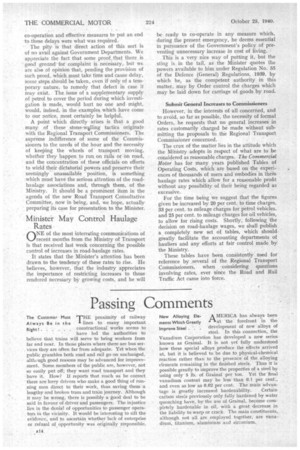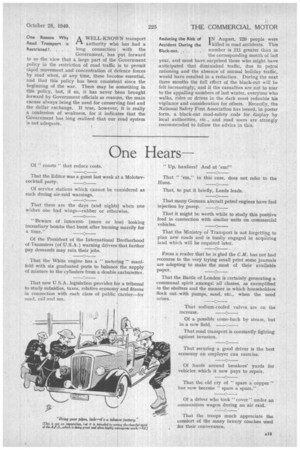Passing Comments
Page 16

Page 17

If you've noticed an error in this article please click here to report it so we can fix it.
The Customer Must THEproximity of railway
Always Be in the lines to many important Right ! constructional works seems to
have led the authorities to believe that trains will serve to bring workers from far and near. In those places where there are bus services they are often far from adequate. Yet when the public grumbles both road and rail go on unchanged, altheugh good reasons may be advanced for improvement. Some members of the public are, however, not so easily put off; they want road transport and they have it. How? If reports that reach us be correct there are lorry drivers who make a good thing of running men direct to their work, thus saving them a lengthy and broken tram and train journey. Although it may be wrong, there is possibly a good deal to be said in favour of driver and passengers. The injustice lies in the denial of opportunities to passenger operators in the vicinity. It 'would be interesting to sift the evidence, and to ascertain whether lack of enterprise or refusal of, opportunity was originally responsible. New Alloying Elements Which Greatly Improve Steel . . . AMERICA has alwaysbeen at the has
in the
development of new alloys of steel. In this connection, the Vanadium Corporation has developed, a new series known as Grainal. -It is not yet fully understood how these special alloys produce the effects arrived at, but it is believed, to be due to physical-chemical reaction rather than to' the presence. Of the. alloying elements remaining in the finished steels. Thus it is possible greatly to improve the properties of a steel by using only 5 lb. of Grainal per ton. . Yet the" final vanadium content may be lessthan 0:1 per . cent., and even as low as 0.02 per cent. The main advan
tage is greatly increased hardenability. Certain carbOn steels previously only fully hardened by water quenching have, by the use of Grainal, become corn.pletely hardenable inoil, with a great decrease in the liability to warp or crack. The main constituents, although not all are employed together, are vanadium, titanium, aluminium and zirconium..
AWELL-KNOWN transport authority who has had a long connection with the
Government, has put forward to us the, view that a large part of the Government policy in the restriction of road traffic is to permit . rapid movement and concentration of defence forces by road when, at any time, these become essential, 'and that this policy has been consistent since the beginning of the war. There may be something in this policy, but, if so, it has never been brought forward by Government officials as reasons, the main excuse always being the need for conserving fuel and . the dollar exchange. If true, however, it is really a confession of weakness, for it indicates that the Government has long realized that our road system is not adequate. One Reason Why Road Transport is Restricted ?.
Reducing the Risk of IN August, 729 people were Accident During the I killed in road accidents. This
Black-out number is 111 greater than in
the corresponding month of last year, and must have surprised those who might have anticipated that diminished traffic, due to petrol rationing and the absence of normal holiday traffic, would have resulted in a reduction. During the next three months the full effect of the black-out will be felt increasingly, and if the casualties are not to soar to the appalling numbers of last winter, everyone Who walks, rides or drives in the dark must redouble his vigilance and consideration for others. Recently, the National Safety First Association has issued, in poster form, a black-out road-safety code for display -by local authorities, etc., and road users are strongly recommended to follow the advice in this.




















































